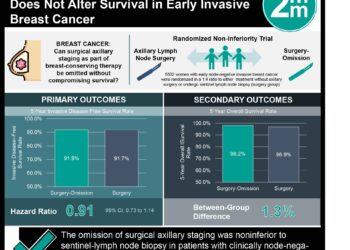Adjuvant chemotherapy may potentially be avoided in breast cancer patients with lymph node-positive disease
1. For postmenopausal women, invasive disease-free survival and distant relapse-free survival was similar between chemoendocrine therapy and endocrine-only therapy
2. For premenopausal women, distant relapse-free survival is greater in those receiving chemoendocrine therapy than endocrine-only therapy
Evidence Rating Level: 1 (Excellent)
Study Rundown: Hormone-receptor-positive, human epidermal growth factor receptor 2 (HER2)-negative, lymph node-positive breast cancer is associated with increased recurrence risk. Recurrence scores based on a 21-gene breast cancer assay are prognostic and used in node-negative patients to stratify the risk of recurrence and potentially avoid chemotherapy. This study explored the impact of adjuvant chemotherapy with endocrine therapy as opposed to endocrine-only therapy on invasive disease-free survival in women with hormone-receptor-positive, HER2-negative, node-positive breast cancer with recurrence scores of 25 or lower. Secondary outcomes included distant relapse-free survival. The women were separated into subgroups based on menopausal status (either pre-or post-menopausal). Invasive disease-free survival within postmenopausal women was not significantly different between chemoendocrine and endocrine-only treatment groups. Chemoendocrine therapy was more beneficial for invasive disease-free survival than endocrine-only therapy in the premenopausal subgroup. The benefit of chemotherapy did not increase with higher recurrence scores. The distant relapse-free survival was similar in postmenopausal women for both treatment groups, while it was greater for the chemoendocrine group than the endocrine-only group in premenopausal women. Limitations to this study include reduced power in the intention-to-treat analysis as a result of a greater-than-expected number of patients declining assigned treatment. Overall, adult female patients with hormone-receptor-positive, HER2-negative, node-positive breast cancer and recurrence scores ranging between 0 and 25 can safely avoid adjuvant chemotherapy.
Click to read the study in NEJM
Relevant Reading: Adjuvant chemotherapy guided by a 21-gene expression assay in breast cancer
In-Depth [prospective cohort]: This multicentre, prospective cohort study was conducted out of 632 centres in 9 countries randomly allocated 5018 adult female patients with hormone-receptor-positive, HER2-negative, node-positive breast cancer and recurrence scores between 0-25 to receive either endocrine-only therapy or chemoendocrine therapy. Exclusion criteria included those with a recurrence score >25. Within each group, the women were split into those who were premenopausal and those who were postmenopausal. The primary outcome was the effect of adjuvant chemotherapy on invasive disease-free survival as well as the correlation of recurrence scores with chemotherapy benefits. Secondary outcomes included distant relapse-free survival. For the postmenopausal group, invasive disease-free survival in patients receiving endocrine therapy was 91.9%, and 91.3% in patients receiving chemoendocrine therapy (HR 1.02; (95% CI, 0.82-1.26)). In the premenopausal endocrine-only therapy group, the invasive disease-free survival was 89.0% and was 93.9% for those receiving chemoendocrine therapy (HR 0.60 (95% CI, 0.43-0.83)). The benefit of chemotherapy did not increase with higher recurrence scores. The postmenopausal treatment groups did not differ significantly in distant relapse-free survival (hazard ratio (HR), 1.05 (95% confidence interval (CI), 0.81-1.37). The premenopausal group receiving chemoendocrine treatment had a significantly higher distant relapse-free survival as compared to the endocrine-only group (HR 0.58 (95% CI, 0.39-0.87)).
Image: PD
©2021 2 Minute Medicine, Inc. All rights reserved. No works may be reproduced without expressed written consent from 2 Minute Medicine, Inc. Inquire about licensing here. No article should be construed as medical advice and is not intended as such by the authors or by 2 Minute Medicine, Inc.







